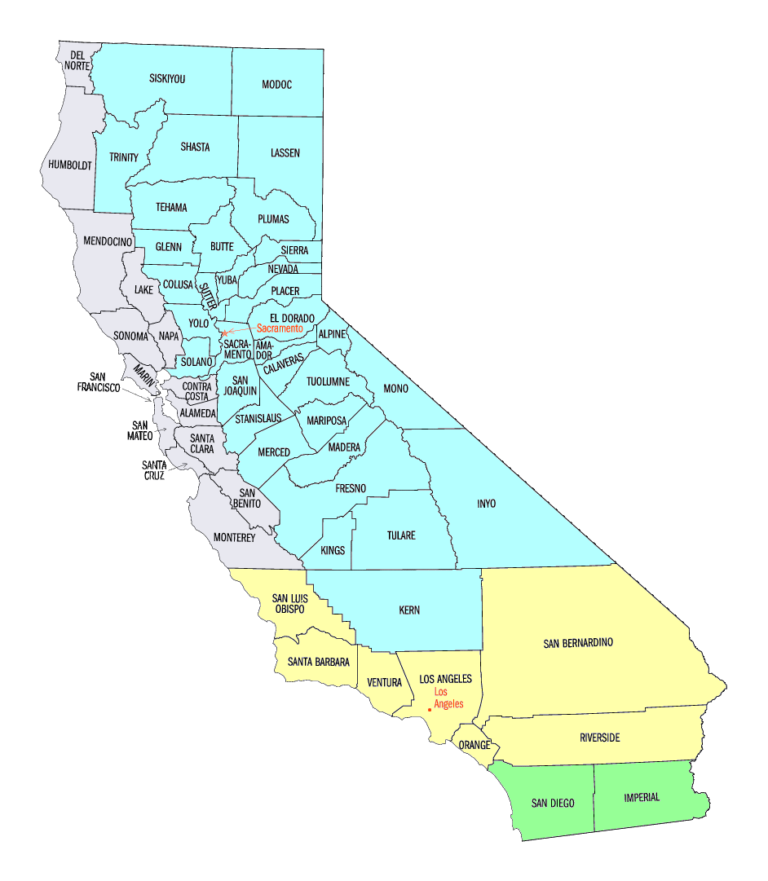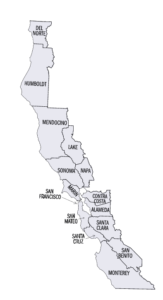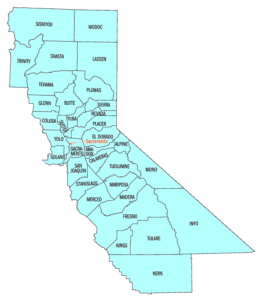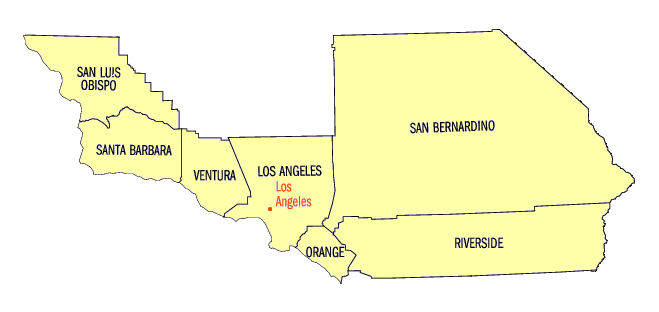
Below you will find information on standard conditions of supervision and travel restrictions, as well as sex offender registry requirements.
Always follow the conditions and restrictions given to you by your U.S. Probation Officer.



As part of your supervised release, you must comply with the following standard conditions of supervision. These conditions are imposed because they establish the basic expectations for your behavior while on supervision and identify the minimum tools needed by probation officers to keep informed, report to the court, and bring about improvements in your conduct and condition.
□ If the probation officer determines that you pose a risk to a third party, the probation officer may require you to notify the
person about the risk and you must comply with that instruction. The probation officer may contact the person and confirm
that you have notified the person about the risk. (check if applicable)
The Northern District of California is comprised of 15 counties. You are allowed to travel freely within these 15 counties. Unless you are given permission in advance by the judge in your case, any requests to travel outside of these 15 counties must be approved in advance by your U.S. Probation Officer.
Failure to do so may result in a violation of your supervision.

The Eastern District of California is comprised of 34 counties. You are allowed to travel freely within these 34 counties. Unless you are given permission in advance by the judge in your case, any requests to travel outside of these 34 counties must be approved in advance by your U.S. Probation Officer.
Failure to do so may result in a violation of your supervision.

The Central District of California is comprised of 7 counties. You are allowed to travel freely within these 7 counties. Unless you are given permission in advance by the judge in your case, any requests to travel outside of these 7 counties must be approved in advance by your U.S. Probation Officer.
Failure to do so may result in a violation of your supervision.

The Southern District of California is comprised of San Diego and Imperial counties. You are allowed to travel freely within these counties. Unless you are given permission in advance by the judge in your case, any requests to travel outside of these counties must be approved in advance by your U.S. Probation Officer.
Failure to do so may result in a violation of your supervision.

Every state and U.S. territory requires those convicted of sex offenses to be added to a registry to be monitored and tracked after their release back into the community. Information about the offender is collected and shared with local and federal authorities, as well as the general public. Requirements and restrictions are often placed on registered sex offenders. That registration process is unique in each state and U.S. territory.

The Sex Offender Registration and Notification Act (SORNA) was passed in 2006 as part of the Adam Walsh Child Protection and Safety Act to provide federal standards for jurisdictions to follow. SORNA calls for states and U.S. territories to meet minimum requirements for sex offender registration and notification.
While SORNA’s guidelines streamlined registration and notification requirements across the country, these requirements are far from uniform. Each jurisdiction determines the details of their own registration process. This leaves a patchwork of rules for sex offenders that vary widely depending on where a registrant lives or works.
Probation Information Network developed a list of questions regarding the sex offender registration requirements across the country. These are questions that might concern the public, victims and their advocates, or those who are facing registration or are currently registered and their loved ones. We then searched the statutes or code of each jurisdiction for the laws surrounding sex offender registration and notification. Where necessary, we consulted with the law enforcement agency in charge of the jurisdiction’s registry to provide clear and concise answers to the following questions:
How long must a sex offender remain on the registry? The length of time a sex offender must comply with registration requirements varies widely depending on the jurisdiction where the registrant lives, and the level of the offense committed. All but 2 jurisdictions offer a path for eventual removal from the registry for at least some of their registrants.
Every jurisdiction has passive community notification in the form of a public sex offender registry website. Concerned citizens are free to search the website and can sign up for email notifications if a sex offender moves into their neighborhood. Some jurisdictions go even further and require active notification, where either law enforcement or the offender themselves is required to directly notify the immediate community that a sex offender is in the area. This can take many forms, including electronic, mail, or in-person notification, publication in local newspapers, and community meetings.
Are there any restrictions on where a registered sex offender can live? Some jurisdictions restrict registrants from living within a measured distance of certain places. This restriction could be for all registrants, or only for higher-level offenders or those under supervision. Some jurisdictions do not have a state-wide restriction but do allow local jurisdictions to enact their own.
Registered sex offenders are usually restricted from certain types of employment, and from working at establishments that specifically cater to minors. Some jurisdictions go even further and restrict registrants from working within a measured distance of certain places.
Returning citizens of every type need to find employment upon reentry, and sex offenders are no exception. Some jurisdictions include registrants’ employment information on the public registry website. This could be the employer’s address or in some cases the name of the employer.
Some jurisdictions require registered sex offenders to report any identifiers they use online, such as email addresses and social media user names. In some jurisdictions that information is included on the public registry website, separate from the registrant’s profile, in a feature that allows the public to search by specific identifiers.
Some jurisdictions require a state-issued ID, such as a driver’s license, to be labeled to identify the holder as a registered sex offender. This label could be the words “Sex Offender” printed on the ID in a prominent place or a more subtle designation known to law enforcement.
Is there a fee to register as a sex offender? Some jurisdictions pass on some of their administrative costs to the registrants. This could be a one-time fee paid only upon initial registration, or an ongoing fee paid annually or quarterly. Some jurisdictions charge a fee every time a registrant updates their information.
Does a sex offender have to register if they work or go to school in a different state? It depends on the state, and how long the registrant will be there. Some jurisdictions require registrants to notify authorities immediately, while others allow limited stays without requiring registration. Registrants currently under supervision usually need permission from their Parole or Probation Officer before traveling and should always consult their supervising officer.
Can a registered sex offender go on vacation? Does a sex offender have to register if they visit a different state? It depends on the state, and how long the registrant will be there. Some jurisdictions require registrants to notify authorities immediately, while others allow limited stays without requiring registration. Registrants currently under supervision usually need permission from their Parole or Probation Officer before traveling and should always consult their supervising officer.
The answers provided are taken directly from the laws found on the state or territory’s legislative website or, where necessary, from the website of the law enforcement agency in charge of the jurisdiction’s registry. In some cases, we contacted state or territory officials for clarification and have directly quoted those conversations.
While we stand by our research, it is for informational purposes only. It should not be considered legal advice and, while we strive to provide accurate and up to date information, it is not guaranteed to be complete or correct. We provide links to each jurisdiction’s legislative and law enforcement websites and maintain a directory of lawyers who specialize in sex offender registration laws. For those currently under supervision, consult with your Parole or Probation Officer for guidance.
CA Penal Code § 290
(d) A person described in subdivision (c), or who is otherwise required to register pursuant to the Act shall register for 10 years, 20 years, or life, following a conviction and release from incarceration, placement, commitment, or release on probation or other supervision, as follows:
(1)(A) A tier one offender is subject to registration for a minimum of 10 years.
(2)(A) A tier two offender is subject to registration for a minimum of 20 years.
(3) A tier three offender is subject to registration for life.
Penal Code section 3003.5(b), the law enacted by ballot initiative in 2006 prohibiting registered sex offenders from living within 2,000 feet of a school or park, was held unconstitutional in 2015. The California Supreme Court found that when there was insufficient affordable housing for registrants, the law had the opposite effect on public safety intended by creating a homeless population of transient sex offenders. CDCR now applies the residency restriction to parolees only on a case by case basis. In 2016, an appellate court ruled that the residency restriction does not apply to registrants on probation as a blanket restriction. The California Supreme Court had earlier ruled this law applied only to persons who were released from custody after November 7, 2006, rather than basing retroactivity on when the registrant gained a residence within the 2000 foot zone. Today, the restriction only applies if it is imposed as a probation or parole condition, based on an individual offender’s record.
– Office of the Attorney General, California Department of Justice
CA Penal Code § 290.46
(a) (1) On or before the dates specified in this section, the Department of Justice shall make available information concerning persons who are required to register pursuant to Section 290 to the public via an Internet Web site as specified in this section. The department shall update the Internet Web site on an ongoing basis. All information identifying the victim by name, birth date, address, or relationship to the registrant shall be excluded from the Internet Web site. The name or address of the person’s employer and the listed person’s criminal history other than the specific crimes for which the person is required to register shall not be included on the Internet Web site. The Internet Web site shall be translated into languages other than English as determined by the department.
CA Penal Code § 290.45
(h) (1) Notwithstanding any other law, a designated law enforcement entity shall only use an Internet identifier submitted pursuant to this chapter, or release that Internet identifier to another law enforcement entity, for the purpose of investigating a sex-related crime, a kidnapping, or human trafficking.
(2) A designated law enforcement entity shall not disclose or authorize persons or entities to disclose an Internet identifier submitted pursuant to this chapter to the public or other persons, except as required by court order.
CA Penal Code § 290.012
(d) No entity shall require a person to pay a fee to register or update his or her registration pursuant to this section. The registering agency shall submit registrations, including annual updates or changes of address, directly into the Department of Justice California Sex and Arson Registry (CSAR).
CA Penal Code § 290.002
Persons required to register in their state of residence who are out-of-state residents employed, or carrying on a vocation in California on a full-time or part-time basis, with or without compensation, for more than 14 days, or for an aggregate period exceeding 30 days in a calendar year, shall register in accordance with the Act. Persons described in the Act who are out-of-state residents enrolled in any educational institution in California, as defined in Section 22129 of the Education Code, on a full-time or part-time basis, shall register in accordance with the Act. The place where the out-of-state resident is located, for purposes of registration, shall be the place where the person is employed, carrying on a vocation, or attending school. The out-of-state resident subject to this section shall, in addition to the information required pursuant to Section 290.015, provide the registering authority with the name of his or her place of employment or the name of the school attended in California, and his or her address or location in his or her state of residence. The registration requirement for persons subject to this section shall become operative on November 25, 2000. The terms “employed or carries on a vocation” include employment whether or not financially compensated, volunteered, or performed for government or educational benefit.
CA Penal Code § 290.
(b) Every person described in subdivision (c), for the period specified in subdivision (d) while residing in California, or while attending school or working in California, as described in Sections 290.002 and 290.01, shall register with the chief of police of the city in which the person is residing, or the sheriff of the county if the person is residing in an unincorporated area or city that has no police department, and, additionally, with the chief of police of a campus of the University of California, the California State University, or community college if the person is residing upon the campus or in any of its facilities, within five working days of coming into, or changing the person’s residence within, any city, county, or city and county, or campus in which the person temporarily resides, and shall register thereafter in accordance with the Act, unless the duty to register is terminated pursuant to Section 290.5 or as otherwise provided by law.
Currently, California Penal Code section 290 requires a registrant who is residing in one location for more than five (5) working days to register with the law enforcement agency (Police or Sheriff Department) having jurisdiction over his/her location.
Unfortunately, under existing law it has not been determined whether a person on vacation or visiting is actually “residing” in a temporary location while in our state. As a result, it is at the discretion of law enforcement to decide when a person vacationing or visiting on a temporary basis must register in their jurisdiction. Therefore, we suggest you contact the law enforcement agency having jurisdiction over the California location you intend to visit. The local law enforcement agency can address any questions you may have concerning your visit to their area.
– Office of the Attorney General, California Department of Justice